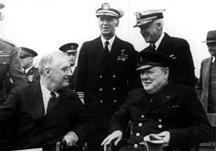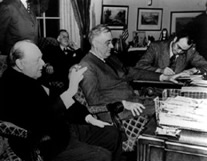|
The "Special Relationship"
The British Diplomatic Files
FDR wrote to Churchill because he was looking for information about the War, and because he wished to establish contact with a British leader who appeared to be a likely candidate for Prime Minister, in the event that the current Prime Minister, Neville Chamberlain, should resign or be forced from office. FDR's intuition would prove correct. On May 10 1940, the very day on which the German Army finally launched its long anticipated attack on France and Low Countries following the six-month period known as the "phony war," Winston Churchill became Prime Minister of Great Britain. From the start, the correspondence between the two men was marked by an easy and affable writing style that foreshadowed the friendship that was to come. In his very first letter, FDR noted their common experience in Naval matters, (FDR had served as Assistant Secretary of the Navy under U.S. President Woodrow Wilson during World War I), as well as their common interest in history. Churchill responded with alacrity and mild humor, choosing the transparent code name "Naval Person," that he would later change to "Former Naval Person" once he had left the Admiralty and moved to the Prime Minister's Residence at number 10 Downing Street. Over the course of the war the two men would exchange thousands of messages, telephone calls, and indirect third party exchanges. They would also meet in person nine times, including the two famous meetings with Soviet Premier Joseph Stalin at Teheran and Yalta, and in the process initiate a new means of carrying out international relations that what we now call "summit diplomacy." The first of these summits took place off the coast of Newfoundland in August 1941, and resulted in the Atlantic Charter, a set of guiding principles intended to govern relations among states with the coming of peace. The last took place at Yalta, in the Crimea, where the "Big Three" issued the "Declaration on Liberated Europe," and attempted to deal with the difficult question of the fate of postwar Poland, where the war began six years before.1 The friendship that developed between Churchill and Roosevelt was not without its difficulties, and it is important not to lose site of the fact that the primary responsibility of both men was to look after national interests. This inevitably led to tensions, which at times became quite pronounced. Serious differences arose, for example, over the question of when and where to open the second front in Europe, and a host of other issues, particularly with respect to economic matters. Furthermore, as the years passed and victory in Europe appeared more and more certain, Roosevelt began to cultivate a bilateral relationship with Stalin that wounded Churchill's pride and signaled the emergence of a bipolar postwar world, dominated not by the British Empire, but rather by the two new Super-Powers.
Sadly, Franklin Roosevelt would not live long enough to witness the Allied victory. Upon learning of his death, on April 12, 1945, Churchill sent an immediate message to the President's wife, Eleanor, in which he wrote: "I have lost a dear and cherished friendship which was forged in the fire of war. I trust you may find consolation in the magnitude of his work and the glory of his name." Material concerning U.S.- British relations and the development of the Anglo-American Alliance can be found in the British Diplomatic Files , and in the Safe Files , under the Arcadia Conference, the Atlantic Charter Conference, Lord Beaverbrook, Lord Halifax, Lend Lease to Great Britain, Lord Lothian, and North Africa (preparations for the Allied invasion of North Afirca, in November 1942). 1 The last actual meeting between Churchill and Roosevelt took place after Yalta, in Cairo Egypt, where they briefly discussed such matters as the atomic bomb. But this last contact was not a summit in the true sense of the word, and really marks little more than a stopover for both men on their return from the important discussions with Stalin at Yalta. |
 On
September 11, 1939, just a few scant days after Hitler inaugurated the
Second World War by unleashing the German Army in Poland, U.S. President
Franklin D. Roosevelt penned a brief but important message to Britain's
First Lord of the Admiralty, Winston Churchill. Roosevelt did not know it
at the time, but his initiative would mark the beginning of one of the most
extraordinary relationships in political history, a relationship marked by
an intimate correspondence unparalleled among national leaders, a
relationship which, in due course, would lead to the establishment of a
military alliance unique among sovereign states.
On
September 11, 1939, just a few scant days after Hitler inaugurated the
Second World War by unleashing the German Army in Poland, U.S. President
Franklin D. Roosevelt penned a brief but important message to Britain's
First Lord of the Admiralty, Winston Churchill. Roosevelt did not know it
at the time, but his initiative would mark the beginning of one of the most
extraordinary relationships in political history, a relationship marked by
an intimate correspondence unparalleled among national leaders, a
relationship which, in due course, would lead to the establishment of a
military alliance unique among sovereign states.
 Nevertheless,
the degree of cooperation and unity of purpose that existed between the
British and American governments during this period remains one of the most
remarkable aspects of the Second World War. This cooperation reached its
apogee in December 1941, with the signing of the Anglo-American Alliance
and the creation of the Combined Chiefs of Staff -- a joint British and
American military command with authority over all Anglo-American
operations. It would continue for the next four years, and lead among other
things to the invasion of Normandy, the development of the atomic bomb, the
creation of the United Nations, and of course the final and utter defeat of
the twin evils of German Nazism and Japanese militarism.
Nevertheless,
the degree of cooperation and unity of purpose that existed between the
British and American governments during this period remains one of the most
remarkable aspects of the Second World War. This cooperation reached its
apogee in December 1941, with the signing of the Anglo-American Alliance
and the creation of the Combined Chiefs of Staff -- a joint British and
American military command with authority over all Anglo-American
operations. It would continue for the next four years, and lead among other
things to the invasion of Normandy, the development of the atomic bomb, the
creation of the United Nations, and of course the final and utter defeat of
the twin evils of German Nazism and Japanese militarism.